GOOD OLD ROCK’N’ROLL!!! «Exclusive for Lossless-Galaxy collection» Part 3 (38 × CD • Remastered • 1960-2025)
Performer: Various Album / collection: «OLDER! Rock’N’Roll — 1St Press — Remastered» Part 3 Label: (c)(p) 1960-2025 生産ヨーロッパとアメリカ Source: Rip by KoGGaN™ scans by inet… Official DR value: •12•12•7•14•11•6•11•8•8•7•8•7•8•12•10•8/8•6•9•8•10•10•9•8•7•7• •9•8•8/8•10•10•15•13•13•12•13•12•6•9• Catalog (Barcode): much… Genre / Style: Pop, Rock, Classic Rock, Pop Rock, Rock’N’Roll, Glam, AOR Year (info): 1960-2025 (38 × CD, 1St Press + Remastered, Collection—) Format: WV (image + .cue) Bitrate: lossless
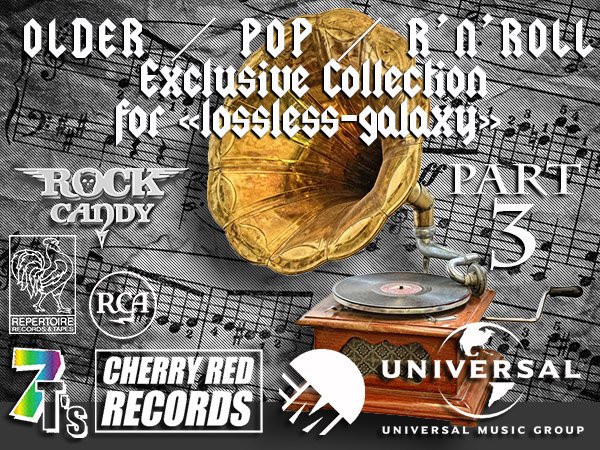
GOOD OLD ROCK’N’ROLL!!! «Exclusive for Lossless-Galaxy collection» Part 3 (38 × CD • Remastered • 1960-2025)
Performer: Various Album / collection: «OLDER! Rock’N’Roll — 1St Press — Remastered» Part 3 Label: (c)(p) 1960-2025 生産ヨーロッパとアメリカ Source: Rip by KoGGaN™ scans by inet… Official DR value: •12•12•7•14•11•6•11•8•8•7•8•7•8•12•10•8/8•6•9•8•10•10•9•8•7•7• •9•8•8/8•10•10•15•13•13•12•13•12•6•9• Catalog (Barcode): much… Genre / Style: Pop, Rock, Classic Rock, Pop Rock, Rock’N’Roll, Glam, AOR Year (info): 1960-2025 (38 × CD, 1St Press + Remastered, Collection—) Format: WV (image + .cue) Bitrate: lossless
06 10, 2025
GOOD OLD ROCK’N’ROLL!!! «Exclusive for Lossless-Galaxy collection» Part 2 (111 × CD • Remastered • 1960-2025)
Performer: Various Album / collection: «OLDER! Rock’N’Roll — 1St Press — Remastered» Part 2 Label: (c)(p) 1960-2025 生産ヨーロッパとアメリカ Source: Rip by KoGGaN™ scans by inet… Official DR value: •8/8•12•6/5•14•6•12•11•10•6•11•11•9•13•11•11•13•8/7•8•8•5•6•10• •11•9•7•6•9/9•7•4•4•6•7•7•7•8•8•8•7•7•9•7•12•6•5•7•5•8•7•8•8•8•6•11•10•10•10•7•12•13•6•8• •12•5•7•13•9•7•7•12•12•12•8•6•7•6•10•7•6•12•6•12•6•7•7•13•12•10•7•6•6•9•5•11•6•8•9•12•14• •11•11•14•6•9•11•11/11•8•11•12•13•11/10•12• Catalog (Barcode): much…
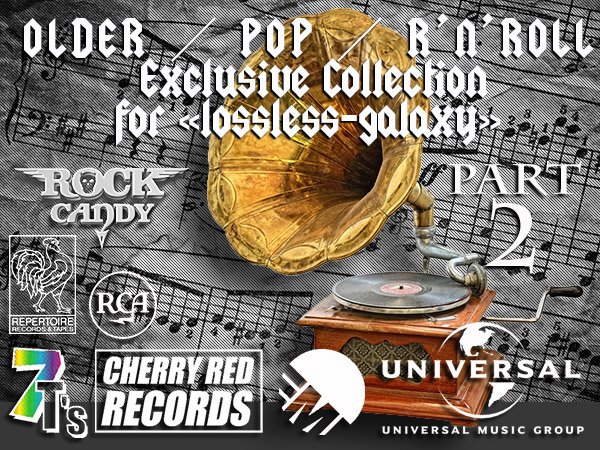
GOOD OLD ROCK’N’ROLL!!! «Exclusive for Lossless-Galaxy collection» Part 2 (111 × CD • Remastered • 1960-2025)
Performer: Various Album / collection: «OLDER! Rock’N’Roll — 1St Press — Remastered» Part 2 Label: (c)(p) 1960-2025 生産ヨーロッパとアメリカ Source: Rip by KoGGaN™ scans by inet… Official DR value: •8/8•12•6/5•14•6•12•11•10•6•11•11•9•13•11•11•13•8/7•8•8•5•6•10• •11•9•7•6•9/9•7•4•4•6•7•7•7•8•8•8•7•7•9•7•12•6•5•7•5•8•7•8•8•8•6•11•10•10•10•7•12•13•6•8• •12•5•7•13•9•7•7•12•12•12•8•6•7•6•10•7•6•12•6•12•6•7•7•13•12•10•7•6•6•9•5•11•6•8•9•12•14• •11•11•14•6•9•11•11/11•8•11•12•13•11/10•12• Catalog (Barcode): much…
05 10, 2025
GOOD OLD ROCK’N’ROLL!!! «Exclusive for Lossless-Galaxy collection» Part 1 (111 × CD • Remastered • 1960-2025)
Performer: Various Album / collection: «OLDER! Rock’N’Roll — 1St Press — Remastered» Part 1 Label: (c)(p) 1960-2025 生産ヨーロッパとアメリカ Source: Rip by KoGGaN™ scans by inet… Official DR value: •8•11•12/12•8•12/12•8•9•11/11•10•11•11•9/9•7/8•7•7•10•11•10•12• •12•13•12•11•5•7•12•10•11•7/8•9•10•10•10•7•10•9•10•12•10•12•7/8/7•7•11•10/9•12•7•8•10/12• •9/9•11•9/8•8•8•11/12•8•10•7•9•6•8•9•8•7•9•7•10•7•10•11•9•8•8•7•11•12•9•11•8•11•11/11•12•
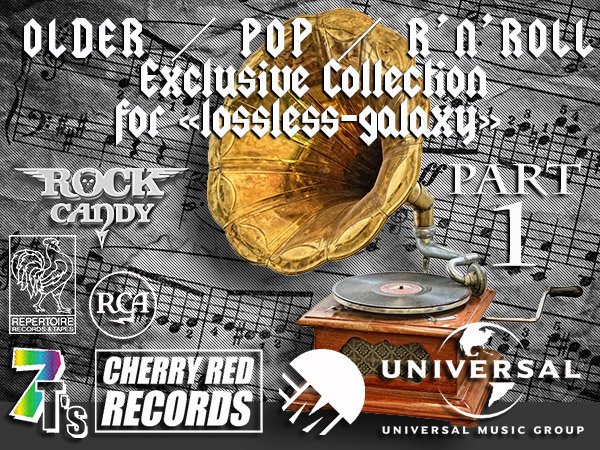
GOOD OLD ROCK’N’ROLL!!! «Exclusive for Lossless-Galaxy collection» Part 1 (111 × CD • Remastered • 1960-2025)
Performer: Various Album / collection: «OLDER! Rock’N’Roll — 1St Press — Remastered» Part 1 Label: (c)(p) 1960-2025 生産ヨーロッパとアメリカ Source: Rip by KoGGaN™ scans by inet… Official DR value: •8•11•12/12•8•12/12•8•9•11/11•10•11•11•9/9•7/8•7•7•10•11•10•12• •12•13•12•11•5•7•12•10•11•7/8•9•10•10•10•7•10•9•10•12•10•12•7/8/7•7•11•10/9•12•7•8•10/12• •9/9•11•9/8•8•8•11/12•8•10•7•9•6•8•9•8•7•9•7•10•7•10•11•9•8•8•7•11•12•9•11•8•11•11/11•12•
05 10, 2025
Жанры
Lossless Galaxy Release
Русская музыка
--Поп
--Рок
--Панк
--Альтернатива
--Металл
--Рэп, Хип-Хоп, R'n'B
--Джаз и Блюз
--Фолк
--Шансон, Авторская песня
--СССР
Зарубежная музыка
--Pop
--Rock
--Hard Rock
--Progressive & Art-Rock
--Pop-Rock & Soft Rock
--Instrumental Rock
--Heavy, Traditional, Industrial Metal
--Power, Gothic, Sympho Metal
--Thrash, Speed, Groove, Modern Metal
--Death, Melodic Death, Doom, Dark Metal
--Black, Pagan, Folk, Viking Metal
--Alternative
--Punk
--Disco, Eurodance
--Rap, Hip Hop, R'n'B
--Reggae, Ska, Dub
--Jazz, Blues, Soul
--Folk, Country, Ethnic
--Electronic, Ambient, New Wave
--House, Techno, Trance
Другие жанры
--New Age, Relax, Meditative & Flamenco
--Chillout, Lounge, Downtempo, Trip-Hop
--Drum & Bass, Jungle, Breakbeat, IDM
--Classical / Классическая музыка
--Soundtrack
--Музыкальные сказки
Vinyl Rip
HI-Res / DVD-Audio / DTS
--SACD
--DSD
--DVD-Audio
Сборники Lossless-Galaxy
Альбомы 2022
Альбомы 2023
Альбомы 2024
Теги
1st Press 2022 2023 2024 2025 70... AOR Black Metal Blues Blues Rock Bootleg Series Classic Rock Death Metal Discography Exclusive for Lossless-Galaxy Folk Rock Fusion Hard Rock Heavy Metal Hi-Res Japanese Edition Jazz Jazz Rock lossless Melodic Death Metal Melodic Rock Modern Electric Blues Pop Pop Rock Power Metal Prog Rock Progressive Metal Progressive Rock Psych Rock Psychedelic Rock Rock SACD Symphonic Metal Thrash Metal Дискографии от KoGGaN
Архивы
Опрос
В каком формате хотели бы видеть релизы на сайте ?
 Автор: sirk, 7 января 2024, Комментариев: 0, Просмотров: 835
Автор: sirk, 7 января 2024, Комментариев: 0, Просмотров: 835Mick Softley - Any Mother Doesn't Grumble (1972) [2016]
Artist Mick Softley
Title Of Album Any Mother Doesn't Grumble
Year Of Release: 1972/2016
Label (Catalog#) Morello [MRLL 65]
Country: UK
Genre Folk Rock Prog Jazzy
Quality: FLAC (image + cue,log)
Bitrate: Lossless
Time: 0:37:04
Full Size: 246mb(+3%)(covers)
Michael 'Mick' Softley (born 1941, in South Woodford, Essex) is a British singer/songwriter and guitarist. A figurehead during the British folk scene, Softley set up his own folk club, released three albums and has been known to work with Mac MacLeod , Donovan Leitch and Maddy Prior. Donovan even covered two of Softley's songs (Goldwatch Blues & The War Drags On) on his early albums. ' Any Mother Doesn't Grumble ' it's a rare milestone of the british folk music!
Title Of Album Any Mother Doesn't Grumble
Year Of Release: 1972/2016
Label (Catalog#) Morello [MRLL 65]
Country: UK
Genre Folk Rock Prog Jazzy
Quality: FLAC (image + cue,log)
Bitrate: Lossless
Time: 0:37:04
Full Size: 246mb(+3%)(covers)
Michael 'Mick' Softley (born 1941, in South Woodford, Essex) is a British singer/songwriter and guitarist. A figurehead during the British folk scene, Softley set up his own folk club, released three albums and has been known to work with Mac MacLeod , Donovan Leitch and Maddy Prior. Donovan even covered two of Softley's songs (Goldwatch Blues & The War Drags On) on his early albums. ' Any Mother Doesn't Grumble ' it's a rare milestone of the british folk music!
Tracks:
-------
01. The Song That I Sing - 4:49
02. Hello Little Flower - 2:05
03. Sing While You Can - 3:18
04. The Minstrel Song - 2:32
05. Magdalene's Song - 1:40
06. Traveller's Song - 2:33
07. From The Land Of The Crab - 3:15
08. Lady Willow - 3:22
09. Great Wall Of Cathay - 2:59
10. If Wishes Were Horses - 4:21
11. Have You Ever Really Seen The Stars - 7:17
12. I'm So Confused - 3:07
Personnel:
------
Mick Softley - Vocals, Guitar
Jerry Donahue - Guitar
Pat Donaldson - Bass
Gerry Conway - Drums, Percussion
Barry de Souza - Percussion
Lyn Dobson - Tenor, Soprano Saxophones, Flute, Harmonica
Tony Cox - Keyboards
All thanks to original releaser
-------
01. The Song That I Sing - 4:49
02. Hello Little Flower - 2:05
03. Sing While You Can - 3:18
04. The Minstrel Song - 2:32
05. Magdalene's Song - 1:40
06. Traveller's Song - 2:33
07. From The Land Of The Crab - 3:15
08. Lady Willow - 3:22
09. Great Wall Of Cathay - 2:59
10. If Wishes Were Horses - 4:21
11. Have You Ever Really Seen The Stars - 7:17
12. I'm So Confused - 3:07
Personnel:
------
Mick Softley - Vocals, Guitar
Jerry Donahue - Guitar
Pat Donaldson - Bass
Gerry Conway - Drums, Percussion
Barry de Souza - Percussion
Lyn Dobson - Tenor, Soprano Saxophones, Flute, Harmonica
Tony Cox - Keyboards
All thanks to original releaser
Внимание! У Вас нет прав для просмотра скрытого текста.
Изменил: sirk по причине: RE-UP
Похожие новости:
Комментарии отсутствуют
Добавить комментарий!
Информация
Посетители, находящиеся в группе Гости, не могут оставлять комментарии к данной публикации.



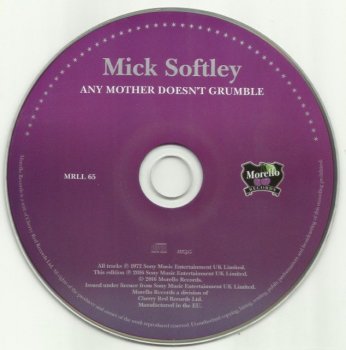
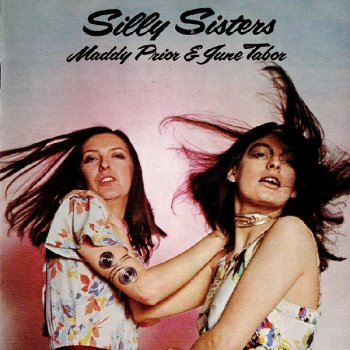
![Sheldon Allman - Folk Songs for the 21st Century (1960) [Remastered 2016]](/uploads/posts/2016-12/thumbs/1481969576_1481969442_ty8787.jpg)

![Emily - Emily (1972) [Remastered 2013]](/uploads/posts/2018-08/thumbs/1534575266_1460448101_cover.jpeg)
![Eric Andersen - Today Is the Highway (1965) [Reissue 1992]](/uploads/posts/2018-06/thumbs/1529681392_front.jpg)